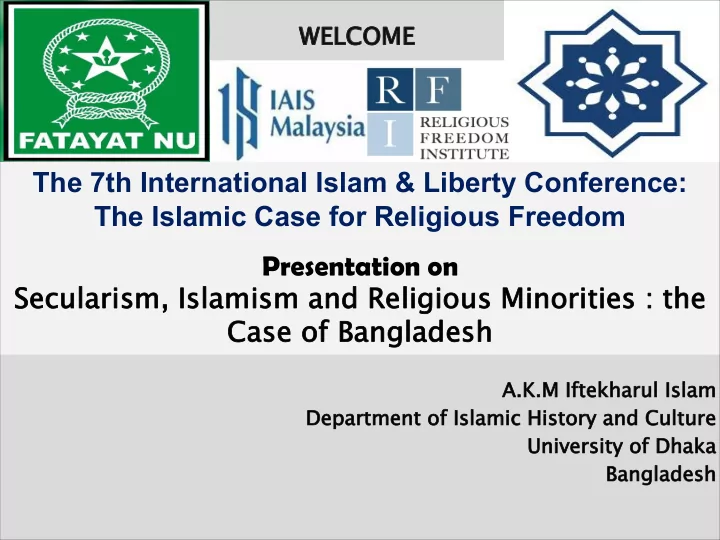

WELCOME The 7th International Islam & Liberty Conference: The Islamic Case for Religious Freedom Presentation on Secularism, Islamism and Religious Minorities : the Case of Bangladesh A.K.M Iftekharul Islam Department of Islamic History and Culture University of Dhaka Bangladesh
About Bangladesh Location : 20°34′-26°38′ NL & 88°01′-92°41′ EL Neighbors:India on west, north & east; Bay of Bengal at south, & Myanmar at Southeast. Area: 147, 570 sq. km. Time-GMT+6 P o p u l a t i o n & R e l i g i o u s Composition : 180 m. Muslim-89%; Hindu- 10%; & Others-1%. Ethnic Groups: Bengali 98%, other 2%. Capital-Dhaka 8 Divisions; 64 Districts Language: Bangla; English. Independence-1971 Muslim Rule- 1204- 1757 British Rule- 1757- 1947 Pakistani Rule-1947- 1971.
q Bangladesh presents interesting confrontation between pro-Islamist and pro- secularist people; q Fluctuations of state policy based on religion; q Communal violence continues to widen driven by political rivalries;
Islam and advent of Islam in Bengal: Ikhtiyar Uddin Mohammad bin Bakhtyar Khalji; Islamism: ‘political movement that favors reordering government and society in accordance with laws prescribed by Islam’; Islamism in Bangladesh: The Farai’di movement of Haji Shariat Ullah (1781-1840), the Tariqah-i- Muhammadiya movement of Mir Nisar Ali alias Titu Mir ( 1782-1831) and the Khilafat movement; Secularism: secularism is the principle of the separation of government institutions and persons mandated to represent the state from religious institution and religious dignitaries.
1972 Constitution and secularism; Islamiat was made compulsory subject; Islamic Foundation was founded in March 1975
Rise of Political Islam; Order no.1 of 1977 Constitutional change (5 th Amendment) dropped secularism from the Constitution; ‘Bismillah-ar-Rahman-ar-Rahim’ is inserted at the beginning of the Constitution; Friday was declared a half-holiday; Religious parties were permitted to act in the politics
Ershad declared Islam as the state religion in 1988; Supported the growth of the private Madrassah system known as ‘the Quomi Madrassah’
Extremist violence has been a recurring problem in the country, where religious minorities are intimidated, threatened, assaulted and killed by Islamic extremists’ intent on silencing dissenting voices; Religious minorities and ethnic communities in Bangladesh are also vulnerable to illegal land grabbing
Implementation of Women and Children Repression Prevention Act 2000 Implementation of Vested Property Return Act 2011 Social consciousness
Angus Stevenson, Oxford Dictionary of English , Oxford University Press, Oxford, 2010, Muhammad Abdur Rahim, Social and Cultural History of Bengal , Vol.1: 1201-1576, Pakistan Historical Society, Karachi, 1963 Neerra Chandhoke, Rethinking Pluralism, Secularism and Tolerance , Sage Publications Ltd., London Rounaq Jahan, Pakistan: Failure in National Integration , University Press Limited, Dhaka, 1972 Rafiuddin Ahmed, ed., Religion, Nationalism and Politics in Bangladesh , South Asia Publication, New Delhi, 1990 R. R. Rozario and S. Uttom , Bangladesh, in M. Kelly (ed.) On the Edge: Religious Freedom and Persecution across Asia , Hindmarsh, SA, 2016 Other Journals and Newspapers
Recommend
More recommend